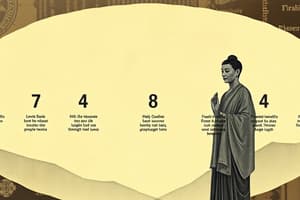Podcast
Questions and Answers
What are the three categories of the Eightfold Path?
What are the three categories of the Eightfold Path?
- Compassion, Knowledge, Community Service
- Religious Law, Inner Devotion, Enlightenment
- Physical Practices, Meditation, Spiritual Insights
- Ethical Conduct, Mental Discipline, Wisdom (correct)
Greed is categorized under the desires that lead to suffering.
Greed is categorized under the desires that lead to suffering.
True (A)
What is Nirvana?
What is Nirvana?
A state of ultimate peace and joy.
The highest stage of wisdom in Sufism is known as ______.
The highest stage of wisdom in Sufism is known as ______.
Match the following types of Yoga with their focus:
Match the following types of Yoga with their focus:
Which of the following is NOT part of the Right Speech in the Eightfold Path?
Which of the following is NOT part of the Right Speech in the Eightfold Path?
Tariqah is focused on outward rituals and practices.
Tariqah is focused on outward rituals and practices.
What is the goal of Fana in Sufism?
What is the goal of Fana in Sufism?
What was the main focus of structuralism?
What was the main focus of structuralism?
Which of the following paradigms acknowledges research biases?
Which of the following paradigms acknowledges research biases?
Functionalism excludes study of emotional responses.
Functionalism excludes study of emotional responses.
Social Constructionism emphasizes the importance of biological factors in the understanding of reality.
Social Constructionism emphasizes the importance of biological factors in the understanding of reality.
Who is known as the 'Father of American Psychology'?
Who is known as the 'Father of American Psychology'?
What is a strength of Critical Perspectives in psychology?
What is a strength of Critical Perspectives in psychology?
Functionalism explores how mental processes help organisms to _____ their environment.
Functionalism explores how mental processes help organisms to _____ their environment.
Which of the following best describes a limitation of structuralism?
Which of the following best describes a limitation of structuralism?
The primary focus of ____________ is on individual lived experiences.
The primary focus of ____________ is on individual lived experiences.
Match the following psychological concepts with their focuses:
Match the following psychological concepts with their focuses:
Match the following paradigms with their key concepts:
Match the following paradigms with their key concepts:
Which paradigm is criticized for overlooking subjective experiences?
Which paradigm is criticized for overlooking subjective experiences?
Functionalists break down consciousness into separate components.
Functionalists break down consciousness into separate components.
Co-operative Inquiry involves participants as co-researchers.
Co-operative Inquiry involves participants as co-researchers.
What does applied psychology focus on?
What does applied psychology focus on?
Name one criticism of Post-Positivism.
Name one criticism of Post-Positivism.
What key concept is associated with Yoga in Indian psychological knowledge?
What key concept is associated with Yoga in Indian psychological knowledge?
The Eightfold Path is a key concept in Sufism.
The Eightfold Path is a key concept in Sufism.
What does Avidya refer to in the context of Indian psychological knowledge?
What does Avidya refer to in the context of Indian psychological knowledge?
The concept of _____ refers to true understanding of self and reality, leading to liberation.
The concept of _____ refers to true understanding of self and reality, leading to liberation.
Match the Indian paradigms with their key concepts:
Match the Indian paradigms with their key concepts:
Which practice is NOT mentioned as a technique in self-knowledge?
Which practice is NOT mentioned as a technique in self-knowledge?
Science and spirituality are considered completely separate domains with no potential for integration.
Science and spirituality are considered completely separate domains with no potential for integration.
What is the ultimate goal of Integral Yoga according to Sri Aurobindo?
What is the ultimate goal of Integral Yoga according to Sri Aurobindo?
What is the primary purpose of conducting research?
What is the primary purpose of conducting research?
Qualitative research is characterized by the use of numbers and statistics.
Qualitative research is characterized by the use of numbers and statistics.
What type of research involves studying a phenomenon over many years?
What type of research involves studying a phenomenon over many years?
Research that aims to create solutions for real-world problems is known as ______ research.
Research that aims to create solutions for real-world problems is known as ______ research.
Which of the following is an example of basic research?
Which of the following is an example of basic research?
Match the type of research with its characteristic:
Match the type of research with its characteristic:
Predicting involves estimating what might happen in the future.
Predicting involves estimating what might happen in the future.
What do research problems help to identify?
What do research problems help to identify?
What is the primary purpose of item review in test writing?
What is the primary purpose of item review in test writing?
Pilot testing should only include participants from the same cultural background.
Pilot testing should only include participants from the same cultural background.
What does the Difficulty Index measure in item analysis?
What does the Difficulty Index measure in item analysis?
The ______ ensures consistency between different evaluators.
The ______ ensures consistency between different evaluators.
Match the following aspects of item analysis with their definitions:
Match the following aspects of item analysis with their definitions:
Which of the following is a characteristic of a good test?
Which of the following is a characteristic of a good test?
Standardization helps compare individual scores to typical population performance.
Standardization helps compare individual scores to typical population performance.
What is the purpose of using Cronbach's Alpha in test reliability?
What is the purpose of using Cronbach's Alpha in test reliability?
Flashcards
Greed
Greed
Desiring too much material wealth and emotional attachments. It's like being stuck in a cycle of wanting, never truly being content.
Ignorance
Ignorance
A misunderstanding of reality, leading to false beliefs and actions.
Hatred
Hatred
Harmful emotions like anger, resentment, and hatred that can lead to violence and suffering.
The Way to End Suffering (Magga)
The Way to End Suffering (Magga)
Signup and view all the flashcards
Shariah (Religious Law)
Shariah (Religious Law)
Signup and view all the flashcards
Tariqah (The Path)
Tariqah (The Path)
Signup and view all the flashcards
Marifah (Gnosis)
Marifah (Gnosis)
Signup and view all the flashcards
Integral Yoga
Integral Yoga
Signup and view all the flashcards
Structuralism
Structuralism
Signup and view all the flashcards
Who was the founder of Structuralism?
Who was the founder of Structuralism?
Signup and view all the flashcards
Introspection
Introspection
Signup and view all the flashcards
Functionalism
Functionalism
Signup and view all the flashcards
Who is the founder of Functionalism?
Who is the founder of Functionalism?
Signup and view all the flashcards
Stream of consciousness
Stream of consciousness
Signup and view all the flashcards
What is the main focus of Functionalism?
What is the main focus of Functionalism?
Signup and view all the flashcards
What are some practical applications of Functionalism?
What are some practical applications of Functionalism?
Signup and view all the flashcards
Science vs. Spirituality
Science vs. Spirituality
Signup and view all the flashcards
Paradigm
Paradigm
Signup and view all the flashcards
Yoga
Yoga
Signup and view all the flashcards
Bhagavad Gita
Bhagavad Gita
Signup and view all the flashcards
Buddhism
Buddhism
Signup and view all the flashcards
Sufism
Sufism
Signup and view all the flashcards
Avidya
Avidya
Signup and view all the flashcards
Research
Research
Signup and view all the flashcards
Research Problem
Research Problem
Signup and view all the flashcards
Basic Research
Basic Research
Signup and view all the flashcards
Applied Research
Applied Research
Signup and view all the flashcards
Quantitative Research
Quantitative Research
Signup and view all the flashcards
Qualitative Research
Qualitative Research
Signup and view all the flashcards
Cross-sectional Research
Cross-sectional Research
Signup and view all the flashcards
Longitudinal Research
Longitudinal Research
Signup and view all the flashcards
Positivism
Positivism
Signup and view all the flashcards
Post-Positivism
Post-Positivism
Signup and view all the flashcards
Critical Perspectives
Critical Perspectives
Signup and view all the flashcards
Social Constructionism
Social Constructionism
Signup and view all the flashcards
Existential Phenomenology
Existential Phenomenology
Signup and view all the flashcards
Co-operative Inquiry
Co-operative Inquiry
Signup and view all the flashcards
Objectivity vs Subjectivity
Objectivity vs Subjectivity
Signup and view all the flashcards
Universalism vs Context-Specificity
Universalism vs Context-Specificity
Signup and view all the flashcards
Item Writing
Item Writing
Signup and view all the flashcards
Item Review
Item Review
Signup and view all the flashcards
Pilot Testing
Pilot Testing
Signup and view all the flashcards
Item Analysis
Item Analysis
Signup and view all the flashcards
Standardization
Standardization
Signup and view all the flashcards
Establishing Reliability
Establishing Reliability
Signup and view all the flashcards
Validity
Validity
Signup and view all the flashcards
Test Analysis
Test Analysis
Signup and view all the flashcards
Study Notes
UGC NET Psychology Checklist
- Emergence of Psychology
- Eastern Systems: Bhagavad Gita, Buddhism, Sufism, Integral Yoga
- Indian Psychology: Pre- and post-independence periods, 1970s, 1980s, 1990s, 2000s
- Western Psychology: Structuralism, Functionalism, Psychoanalysis, Behaviorism, Humanistic, Cognitive, Multiculturalism
- Founders: Wundt, Freud, James, Dilthey
- Paradigms: Positivism, Post-positivism, Social Constructionism, Existential Phenomenology, Indian paradigms
- Research Methodology
- Research problems, Variables, Hypotheses, Sampling, Ethics
- Quantitative, Qualitative, Mixed methods
- Observation, Survey, Experimental, Case Studies, Ethnography
- Measures of central tendency and dispersion, Normal Probability Curve
- Parametric tests (t-test, Wilcoxon, Mann-Whitney, Kruskal-Wallis), Non-parametric tests (Sign Test)
- Correlation (Product Moment, Rank Order, Partial, Multiple), Regression (Simple, Multiple)
- ANOVA, MANOVA, ANCOVA, Factor Analysis
- Statistics
- Types of tests, Test construction (item writing, analysis)
- Reliability, Validity, Norms
- Psychological Testing
- Intelligence, Creativity, Aptitude, Personality, Neuropsychological tests
- Attitude Scales: Likert, Semantic Differential, Stapel
- Applications: Clinical, Organizational, Education, Counseling, Military
- Biological Basis of Behavior
- Neurons, Synaptic transmission, CNS/PNS, Neuroplasticity
- Motivation: Hunger, Thirst, Sleep, Sex; Emotion: Limbic System, Hormonal regulation
- Genetics: Chromosomal anomalies, Nature-Nurture studies
- Methods: Invasive (Lesions, Degeneration), Non-invasive (EEG, Scans)
- Attention, Perception, Learning, Memory, Forgetting
- Attention: Models (Broadbent, Treisman)
- Perception: Gestalt, Illusions, Perceptual constancy, Depth, Subliminal perception
- Learning: Thorndike, Classical/Operant Conditioning, Observational Learning
- Memory: Sensory, STM, LTM (episodic, semantic), Forgetting theories (Interference, Decay, Motivated forgetting)
- Thinking, Intelligence, Creativity
- Intelligence Theories: Spearman, Gardner, Goleman, Thurstone
- Creativity: Torrance, Guilford, Getzels
Preparation Schedule
- Day 1: Emergence of Psychology (Indian & Western Perspectives, Paradigms)
- Day 2: Research Basics (Sampling, Variables, Ethics) + Observation & Survey Methods
- Day 3: Statistics (Central Tendency, Normal Probability Curve, Parametric/Non-parametric tests)
- Day 4: Correlation, Regression, Experimental Designs
- Day 5: Psychological Testing + Applications
- Day 6: Biological Basis (CNS, PNS, Neurotransmitters, Motivation, Emotion)
- Day 7: Attention, Perception, Memory
- Day 8: Learning Theories + Forgetting Theories
- Day 9: Thinking, Intelligence, Creativity
- Day 10: Personality, Motivation, Stress
- Day 11: Social Psychology
- Day 12: Human Development & Psychotherapies
- Day 13: Emerging Areas + Mock Tests
- Day 14: Full Syllabus Revision + Mock Tests
Emergence of Psychology
- The roots of Eastern influence on Western thought trace back to the 4th century BC.
- Renowned psychologists such as Carl Rogers, Abraham Maslow, William James, and Erich Fromm have drawn inspiration from ancient Eastern wisdom.
Bhagavad Gita
- Part of the Mahabharata, specifically in the Bhishma Parva.
- Composed of 18 chapters (Yogas) and 701 verses (slokas).
- Dialogue between Lord Krishna (divine intellect) and Arjuna (individual self).
- Set on the battlefield of Kurukshetra.
- Key chapters: Arjuna Vishada Yoga (Arjuna's existential crisis).
Core Themes (Bhagavad Gita)
- Moksha Sanyasa Yoga (Renunciation): Inner conflict resolution and liberation.
- Dharma (Duty): Ethical, responsible, and selfless actions.
- Karmayoga (Path of Action): Selfless action without attachment to outcomes.
- Jnanayoga (Path of Knowledge): Self-realization and understanding the true self.
- Bhaktiyoga (Path of Devotion): Devotion and surrender to a higher power.
Four Noble Truths (Buddhism)
- Dukkha (Suffering): Inherent in life.
- Samudaya (Origin of Suffering): Driven by craving and desire.
- Nirodha (Cessation of Suffering): achieved by overcoming attachments and cravings.
- Magga (Path to Cessation): Following the Eightfold Path for freedom.
Four Stages of Spiritual Growth (Sufism)
- Shariah (Religious Law): Foundation of morality and ethics.
- Tariqah (The Path): Focus on inner devotion, meditation, and prayers.
- Haqiqah (Truth): Direct realization of divine presence.
- Marifah (Gnosis): Personal spiritual experiences.
Integral Yoga
- Ancient Indian philosophy unifying body, mind, and soul.
- Combines physical postures, breathing techniques, and meditation for holistic development.
- Key types: Hatha Yoga, Jnana Yoga, Bhakti Yoga, Karma Yoga
Psychology of Yoga
- Offers a framework for mental well-being focusing on mind and self-discipline.
- Stages of mind: Ksipta (Restless), Mudha (Torpid), Viksipta (Distracted), Ekagra (Concentrated), Niruddha (Controlled).
Five Stages of Citta (Mind)
- Ksipta (Restless): Distracted, hyperactive state.
- Mudha (Torpid): Dull, lethargic.
- Viksipta(Distracted): Between focus and distraction
- Ekagra (Concentrated): Focused and calm
- Niruddha (Controlled): Highest state of inner peace.
Academic Psychology in India
- Increased enrollment in psychology programs.
- Dynamic research across various areas (clinical, social, developmental, cognitive, and educational).
- Strong support systems (e.g., ICSSR, ICMR).
- Establishment of research institutes.
- Robust international collaboration and cross-cultural studies.
- Growing focus on indigenous perspectives.
- Heightened mental health consciousness.
Post-Independence Era (1950s -1960s)
- Significant increase in academic psychology.
- Government investment in higher education, establishment of psychology departments.
- Questioning of Western theories, development of Indian psychology.
- Explored traditional mind-body practices for mental health
- Formation of Indian Council for Social Science Research (ICSSR)
Indigenization Movement (1990s)
- Growing movement toward localization of psychology.
- Emergence of indigenous psychology.
- Development of new theories using traditional practices (yoga, meditation).
- Renewed interest in Indian philosophy and religion for psychological applications.
Paradigmatic Concerns and Identity Crisis (2000s)
- Challenges in reconciling traditional Western approaches with culturally sensitive methods.
- Desire for a distinction between Western and Indian schools of thought.
Colonial Encounter:
- Cultural imposition.
- Loss of cultural identity.
- Economic exploitation.
- Complex impact on both colonizers and colonized.
- Postcolonialism examination of legacies of colonialism.
- Critique of western psychological theories and how they were imposed.
- Cultural biases in Western Psychology
Ancient Greek Philosophers
- Socrates (469–399 BCE): Virtue and self-awareness through understanding thoughts and actions.
- Plato (427-347 BCE): Proposed the tripartite soul (reason, will, appetite); emphasized the importance of ideas over sensory experiences.
- Aristotle (384-322 BCE): Introduced the importance of empirical methods; rejected innate knowledge. emphasized experience-based learning.
Hippocrates (460-370 BCE):
- Father of Medicine”
- Proposed the four humors (blood, yellow bile, black bile, phlegm) theory of personality and health, influenced medical thought.
Rene Descartes (1596-1650):
- Mind-Body Dualism: Proposed that the mind and body are distinct entities but interact through the pineal gland.
John Locke (1632-1704):
- Tabula Rasa (Blank Slate): Argued that the mind is a blank slate at birth, with all knowledge derived from experience and sensory input. This was a key contribution to Empiricism.
Structuralism:
- Wilhelm Wundt and Edward Titchener.
- Introspection (systematic self-observation) as a primary method.
- Focused on breaking down consciousness into basic elements (sensations, feelings, and images).
Functionalism:
- William James (often considered the "Father of Pragmatism").
- Focused on functions (purpose) of mental processes enabling adaptation to the environment.
- Emphasized the stream of consciousness.
Gestalt Psychology:
- Max Wertheimer, Kurt Koffka, and Wolfgang Köhler.
- Emphasized the importance of the “whole” and the organization of sensory information.
- Developed principles to explain how we perceive patterns, forms, and wholes (e.g., proximity, similarity, closure).
Psychoanalysis:
- Sigmund Freud
- Proposed a tripartite personality structure (id, ego, superego) and psychosexual stages of development (oral, anal, phallic, latent, genital).
- Focused on unconscious drives, early childhood experiences, and conflicts in shaping behavior
Methods:
- Free Association: Encouraging patients to speak freely about their thoughts/feelings.
- Dream Analysis: Interpreting symbolic meaning in dreams.
- Transference: Analyzing client emotions/feelings in relation to the therapist.
- Counter-transference: Analyzing therapist emotions/feelings in relation to client.
- Resistance: Noticing when clients resist certain topics in therapy.
Behaviorism
- John Watson, B.F Skinner
- Emphasized observable behaviors (not internal mental states).
- Focused on conditioning (classical and operant) to explain learning and behavior.
Humanism:
- Carl Rogers, Abraham Maslow
- Emphasized the importance of free will, personal growth, and self-actualization.
- Introduced concepts like self-concept, unconditional positive regard, and the hierarchy of needs.
Maslow's Hierarchy of Needs:
- Arranged needs in a hierarchical pyramid.
- Starts with basic physiological needs like air, food, and shelter and progresses to safety, belonging, esteem, and lastly self-actualization.
Studying That Suits You
Use AI to generate personalized quizzes and flashcards to suit your learning preferences.




